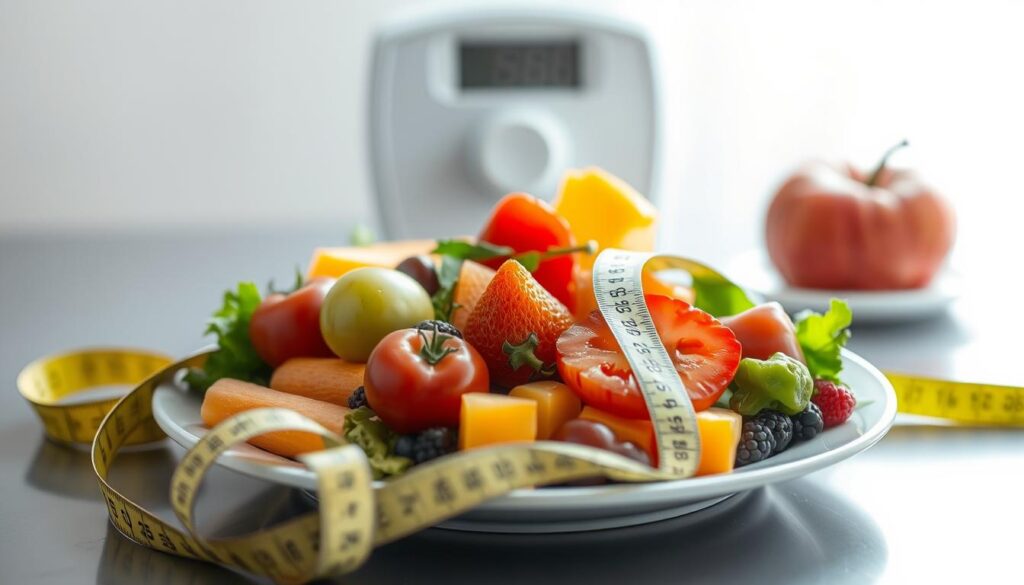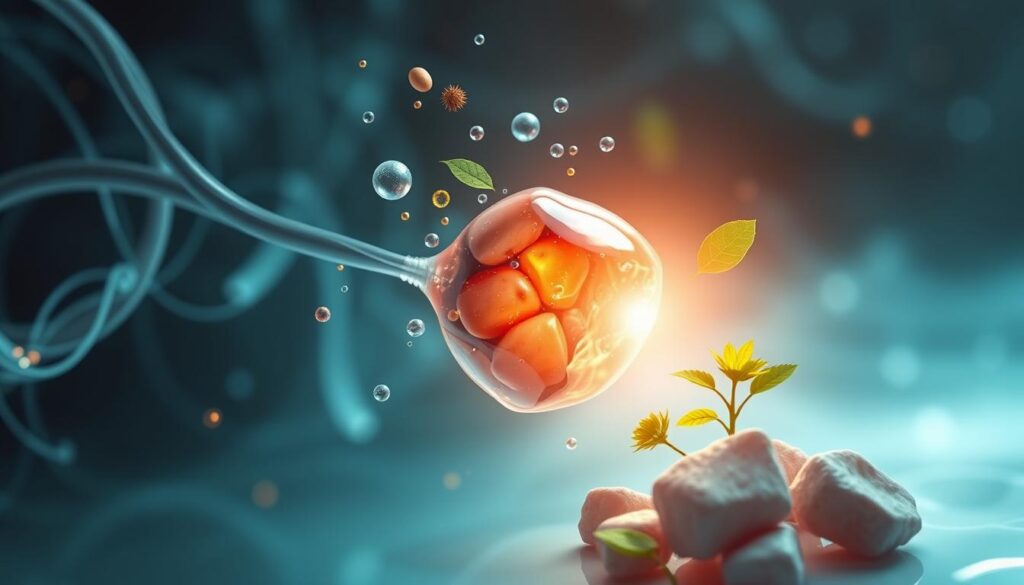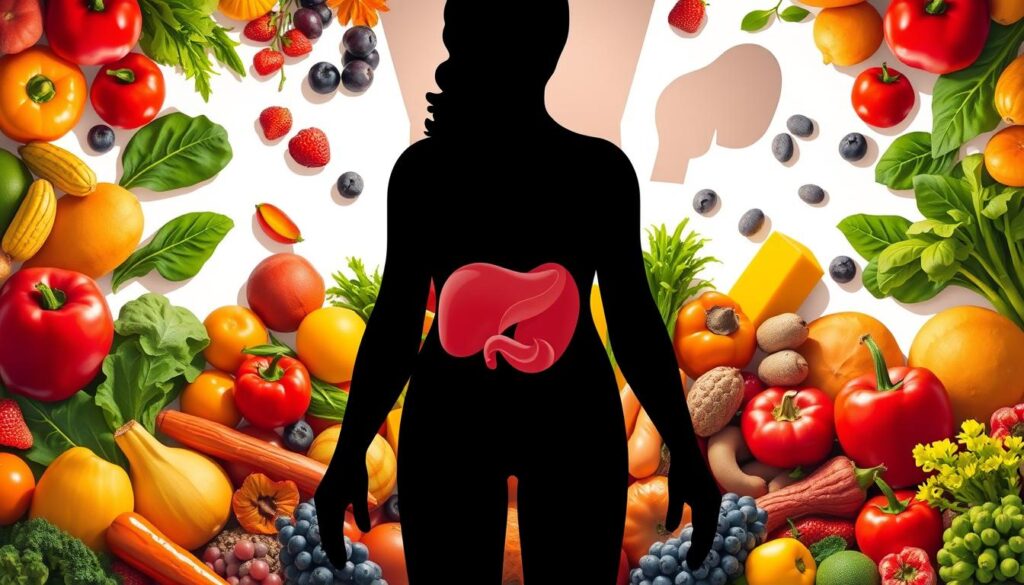If you’re trying to lose weight, you might worry about gallstones. Losing weight can affect your gallbladder. It’s important to know how weight and gallbladder health are connected.
Being overweight or obese raises the risk of gallstones, especially in women Losing weight quickly, like after surgery or on very low-calorie diets, can also increase this risk. This is because the liver releases more cholesterol into the bile. The gallbladder might not empty well, causing bile to build up and stones to form.
Key Takeaways
- Excess weight, especially in women, increases the risk of gallstones.
- Rapid weight loss can trigger gallstone formation due to changes in bile composition and gallbladder function.
- Weight-loss surgery and very low-calorie diets are associated with a higher risk of gallstones.
- Maintaining a slow and steady weight loss pace of 5-10% over 6 months can help reduce the chances of developing gallstones.
- Regular physical activity and a balanced diet can also play a role in preventing gallstone problems during weight loss.
Understanding Gallstones and Their Formation
Gallstones are hard deposits in the gallbladder. They form when bile has too much cholesterol or bilirubin. Not enough bile acids or lecithin can also cause them. These stones can be small or as big as a golf ball.
The Role of Bile in Gallstone Development
Bile is key in making gallstones. An imbalance in bile can lead to gallstones. This imbalance can cause gallbladder sludge, a sign of stones coming.
Types of Gallstones and Their Causes
There are two main types of gallstones. Cholesterol gallstones happen when there’s too much cholesterol in the bile. Pigment gallstones are made of bilirubin, from broken-down red blood cells.
Risk Factors for Gallstone Formation
- Being overweight can change bile’s balance, making gallstones more likely.
- Quick weight loss also raises the risk of gallstones.
- Some ethnic groups, like Native Americans and Hispanics, are at higher risk.
- Diabetes can increase the chance of getting gallstones.
- Birth control pills or hormone therapy can also raise the risk.
Knowing why gallstones form is important. It helps us deal with this common health problem.
The Connection Between Body Weight and Gallbladder Health
Your body weight affects your gallbladder health a lot. Being overweight, especially around the waist, raises your chance of getting gallstones. This is because extra weight can make your bile cholesterol levels go up and mess with your gallbladder’s work.
Good news is losing weight slowly can lower your gallstone risk. But losing weight too fast might make it worse. Eating right and staying active helps keep your gallbladder healthy.
The Impact of Excess Weight
About 20% of adults worldwide have gallstones. Around 25% of those with gallstones need surgery to remove their gallbladder. Most gallstones are made of cholesterol, while 10% are pigment stones.
Being overweight greatly increases your chance of getting gallstones. Extra body fat makes more cholesterol. Also, having too much fat around your waist raises your gallstone risk, no matter your BMI.
Maintaining a Healthy Weight
Slow weight loss, 1-2 pounds a week, through healthy eating and exercise can lower your gallstone risk. But losing weight too fast or too much can make it worse.
Going back and forth with weight, or “yo-yo dieting,” also raises your gallstone risk. Keeping a steady, healthy weight is key for your gallbladder.
In short, your weight and health are closely tied to your gallbladder’s function. Too much weight, especially around the waist, can lead to gallstones. But losing weight slowly and staying healthy can help prevent and manage gallbladder problems.
Can Weight Loss Cause Gallstones: The Scientific Evidence
Losing weight can affect your gallbladder health. Fast weight loss, surgery, and very low-calorie diets can lead to gallstones. Knowing why this happens can help you lose weight safely.
Impact of Rapid Weight Loss
Fast weight loss of 3 or more pounds a week can cause gallstones. This is because it changes your bile’s makeup. It makes it more likely to form solid crystals, or gallstones, in your gallbladder.
Also, fast weight loss can make your gallbladder not empty right. This leads to bile buildup and a higher risk of gallstones.
Weight Loss Surgery and Gallstone Risk
People who have weight-loss surgery, like gastric bypass or sleeve gastrectomy, face a high risk of gallstones. In the first 3 to 6 months, they lose a lot of weight. This greatly increases their chance of getting gallstones.
Very Low-Calorie Diets and Gallstone Formation
Even without surgery, very low-calorie diets can raise your gallstone risk. Studies show about 10-12% of people on such diets for 8-16 weeks will get gallstones. The drug ursodiol is often given to prevent gallstones in those losing weight fast or on very low-calorie diets.
“Rapid weight loss of 3 or more pounds per week can trigger gallstone formation by altering bile composition and impairing gallbladder emptying.”
Identifying Common Symptoms of Gallstones During Weight Loss
Starting your weight loss journey? It’s key to know about gallstone symptoms. Gallbladder issues can pop up when you lose weight fast. Spotting the signs early is crucial.
The usual gallstone symptoms include:
- Mild to severe pain in the upper right side or middle of the abdomen, often after meals
- Bloating, sudden weight loss, jaundice (yellowing of eyes and skin), indigestion, heartburn, acid reflux, and gas
Gallstones can also cause acute gallbladder pain. This is serious and includes intense pain, nausea, vomiting, fever, and jaundice. If you see these signs, get help fast.
Women are more likely to have gallbladder problems than men. The risk goes up with age, especially after 40. Eating right and exercising often can lower your risk. But watch your body closely while losing weight.
Knowing the gallstone symptoms and getting medical help when needed is smart. This way, you can handle any gallbladder issues and keep losing weight safely.
The Dangers of Weight Cycling and Gallstone Development
Weight cycling, or “yo-yo dieting,” raises your risk of gallstones. The bigger your weight swings, the more likely you are to get gallstones. Even small weight changes can lead to gallstones, not just your weight.
Understanding Yo-Yo Dieting Effects
Fast weight loss can upset your bile balance, causing gallstones. Gallstones block bile ducts, leading to pain and sometimes surgery.
Up to 25% of people who lose weight fast may get gallstones. One-third of them need surgery for their symptoms.
Prevention Strategies for Weight Cycling
- Avoid crash diets and focus on sustainable, gradual weight loss of no more than 1-2 pounds per week.
- Develop healthy eating habits and a regular exercise routine to maintain a stable weight over time.
- If you do experience weight fluctuations, be sure to engage in regular physical activity, which can help reduce the risk of gallstone development.
Choose a balanced way to manage your weight to avoid gallstones. This way, you can stay healthy and avoid gallstone problems.
Safe Weight Loss Strategies to Prevent Gallstones
Getting to a healthy weight is key, but do it slowly and safely. Losing 5 to 10 percent of your weight in six months is best. This slow pace helps avoid gallstones more than quick weight loss.
To help prevent gallstones, eat well and move more. Plan your meals, keep a food diary, and find healthy recipes you like. Eat slowly, don’t eat while doing other things, and sleep enough to help you lose weight.
It’s okay to have treats sometimes. Just make sure you keep eating healthy most of the time. Find a balance that keeps you happy and healthy for the long haul.

“Gradual, sustainable weight loss is the best approach to prevent gallstones and maintain good health in the long run.”
Using these safe weight loss strategies, you can lose weight safely. This way, you lower your chance of getting gallstones.
The Role of Diet in Gallstone Prevention
Eating well is key for a healthy gallbladder. Avoid very low-fat diets. They can hurt gallbladder work. Eat lots of fruits, veggies, and whole grains.
Recommended Foods and Nutrients
To keep your gallbladder healthy, eat these foods:
- High-fiber foods like beans, lentils, and whole grains help prevent gallbladder sludge.
- Healthy fats in nuts, avocados, and fatty fish are good for your gallbladder.
- Fruits and veggies are full of antioxidants. They protect your gallbladder.
- Drinking some coffee might help your gallbladder work better.
- Make sure you get enough calcium, vitamin C, magnesium, and folate. They help your gallbladder stay healthy.
Foods to Avoid
It’s also important to avoid some foods:
- Stay away from refined carbs like white bread, pastries, and sugary drinks. They can increase gallstone risk.
- Limit red and processed meats, and eggs, if you eat them in an unhealthy way. They might raise gallbladder disease risk.
Eating a balanced diet is crucial for gallbladder health. It helps lower gallstone risk. Talk to a dietitian for advice that fits you.
Medical Treatments and Prevention Options
For mild gallbladder issues, simple lifestyle changes can help. But for serious cases, doctors might suggest ursodiol. This medicine helps stop gallstones when you lose weight fast.
If you have gallstones that bother you, you might need surgery. A cholecystectomy removes your gallbladder. Most people feel better within two weeks. It’s key to see your doctor often, especially if you’re over 40 or at risk.
- Approximately 20 million Americans have gallstones.
- Around 10 percent of people needing gallbladder removal may require open cholecystectomy surgery.
- Ursodeoxycholic acid treatment for gallstones may take up to 24 months to be effective.
- Endoscopic retrograde cholangiopancreatolography (ERCP) is an alternative treatment option for gallstones when surgery is not feasible.
While gallstone treatment and gallbladder surgery are sometimes needed, preventing them is better. Knowing the risks and staying healthy can lower your chance of getting gallstones.

Exercise and Physical Activity Guidelines for Gallstone Prevention
Regular exercise is great for preventing gallstones and keeping you healthy. Try to do at least 150 minutes of activity like brisk walking or dancing each week. Also, do muscle-strengthening activities like weightlifting or push-ups at least twice a week.
Start with small steps and slowly get more intense. This helps your body get used to it and lowers injury risk. If you have health issues, talk to a doctor before starting a new workout.
Even a little bit of exercise is good for your gallbladder and health. By making exercise a habit, you help prevent gallstones and keep your body healthy for a long time.


A Life-Changing Experience with This Weight Loss Supplement (Nagano Tonic)
I’ve always struggled with finding a weight loss solution that actually works for me. Like many, I’ve tried numerous diets, exercise routines, and supplements over the years—some worked for a short time, but nothing ever gave me long-term results. That was until I decided to try the weight loss supplement I found : Link to the Supplement.
From the moment I started using it, I noticed a difference. Not only did I feel more energized, but my cravings also became more manageable. The best part? I started seeing results much quicker than I anticipated! Over the course of just a few weeks, I noticed a significant reduction in belly fat and overall weight loss that I hadn’t been able to achieve before.
What makes this supplement stand out from all the others I’ve tried is how it supports me in my daily routine without any jitters or energy crashes. I’m able to stay focused and motivated, which has made it easier to stay on track with my diet and exercise plan.
This product truly exceeded my expectations, and I feel more confident and healthier than ever before. If you’re struggling with your weight loss journey like I was, I highly recommend giving this supplement a try. It’s been a game-changer for me, and I’m sure it can work wonders for you too!
Contant Them on email .. tonicnagano50@gmail.com
I’ve tried so many weight loss products over the years, but nothing worked like this supplement! Since I started using it, I’ve noticed a big difference in my energy levels and appetite control. In just a few weeks, I’ve lost weight and feel so much better. It’s been easy to stick with, and the results speak for themselves. Highly recommend this to anyone looking to make a real change!
wasn’t sure what to expect, but this weight loss supplement has really impressed me! After just a few weeks of use, I’ve already dropped a few pounds and feel more motivated to stay active. It’s helped curb my cravings and boosted my energy throughout the day. I’m excited to keep going and see even better results. Definitely worth trying!
Reach them on tonicnagano50@gmail.com
I was skeptical at first, but this supplement has truly made a difference in my weight loss journey. I’ve lost weight without feeling deprived or sluggish. My cravings are under control, and I feel more confident in my body. It’s easy to incorporate into my daily routine, and the results speak for themselves. I’m so glad I gave it a try!
Thanks David, i do use the link to make my purchase. you can get too here http://surl.li/iasppy
This Nagano Tonic has been amazing! In just a few weeks, I’ve lost weight, feel more energized, and my cravings are under control. Highly recommend it!
Thats the link to purchase http://surl.li/iasppy